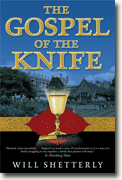The Gospel of the Knife
Will Shetterly
book reviews:
· general fiction
· chick lit/romance
· sci-fi/fantasy
· graphic novels
· nonfiction
· audio books
· author interviews
· children's books @
curledupkids.com
· DVD reviews @
curledupdvd.com
newsletter
win books
buy online
links
home
for authors
& publishers
for reviewers

 |
The Gospel of the Knife Will Shetterly Tor Paperback 320 pages July 2010 |
|
How would you feel if you discovered you were of the royal bloodline of Jesus Christ? Would you want to use your powers for good, or for evil? Would you require sacrifices of your followers? If you were the king or prince of the world, how would you handle the duties and responsibilities inherent in the job description? Mark Christopher (Chris) Nix, a normal fourteen-year-old boy coming of age in the late 1960s, finds himself confronted with these issues and more in The Gospel of the Knife
So, is The Gospel of the Knife There are other problems some Christians would likely have with The Gospel of the Knife Since Satan, the Devil, is generally known as being the Father of Lies, this section, it should be easy to tell, will likely be antithetical to the beliefs of many Christians. Jews and Christians worship one God, not two, so saying that there are two Gods instead of that the two names were or are different names used for one God also will bother many. If one is an atheist or an agnostic, or a follower of another religion/philosophy, one may likely think of this book as a fantasy, though with a questionable interpretation of history, at best. What are my personal feelings about the handling of various Biblical characters in this book? While I don’t agree with Will Shetterly’s interpretation of many things, in particular in the section called “The Gospel of the Knife,” I tried to disassociate myself as much as possible and regard the novel solely on its merits. It has actually many merits, and much to recommend it. I would say to me that the first section of the novel, entitled (like one of my favorite T.S. Elliot poems) “The Wasteland,” was my favorite part of the whole. It seems to be the most believable section and is really well-written. “The Wasteland” is about Chris’s life as a pretty typical and rebellious fourteen-year-old. He has problems with bullies and thinks his father is too strict with him. Eventually, following an argument with his dad, Chris runs away from home and envisions hitching to San Francisco and living in a hippie commune. Picked up by people he assumes are fun-loving hippies or druggies in a flowered van, he’s disappointed when they turn out to be Jesus Freaks instead. One good thing about his being picked up by the Jesus Freaks is that it is in the van that he meets for the first time CC and starts a romance with her that continues throughout the novel. The Gospel of the Knife Originally published on Curled Up With A Good Book at www.curledup.com. © Douglas R. Cobb, 2007 |
|
|
|
 Click here to learn more about this month's sponsor! |
|
| fiction · sf/f · comic books · nonfiction · audio newsletter · free book contest · buy books online review index · links · · authors & publishers reviewers |
|
| site by ELBO Computing Resources, Inc. | |
 Compared favorably by some reviewers to Neil Gaiman’s
Compared favorably by some reviewers to Neil Gaiman’s